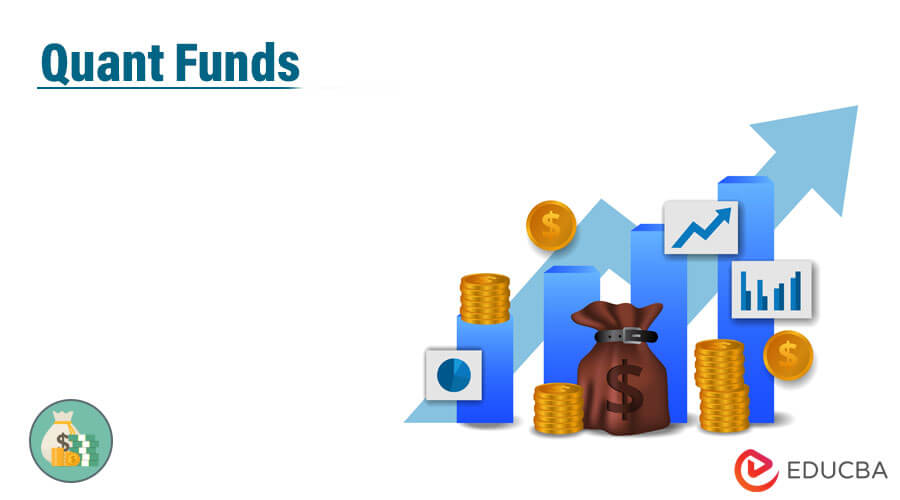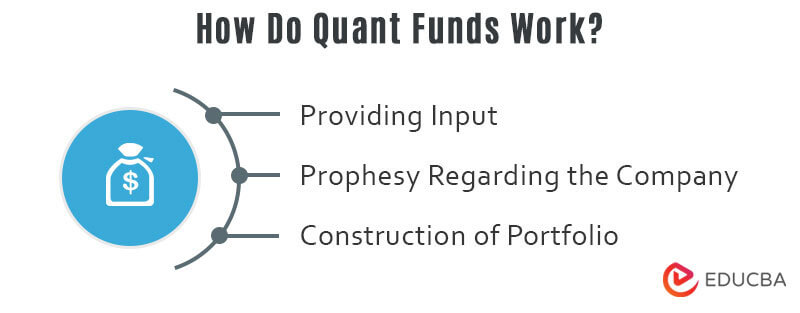Updated July 15, 2023

Definition of Quant Funds
Quant funds or Quantitative funds are such types of investment funds in which the investment selection and other related decisions are taken with the help of automated programs, analytical methods, and quantitative models without human efforts.
Explanation
Quant funds are used to minimize human efforts or help humans get things done more accurately and with a profit-oriented view while considering investment type or other decisions relating to the investment process. Although all the work is done digitally in Quant funds, there is still importance and a manager’s work requirement. A manager checks all the work of this process, and decisions are subject to the manager’s discretion.
How Do Quant Funds Work?
The working process of Quant funds is divided into three parts; the manager monitors all three parts.
- Providing Input: This is the Quant funds’ first step or working part. This input provides to the computer system. A computer then sorts the list of all the profitable companies, yields dividends, and can grow in the future. It neglects almost all those companies with high risk, insufficient capital, and debts.
- Prophesy Regarding the Company: In this second step, prophesy or estimates regarding the company’s condition or price, risk, and other factors are made.
- Construction of Portfolio: After the above two steps, the next step in Quant funds is portfolio construction to know the impact of funds on each other. It also helps in reducing the risk and to generate returns. A manager has the same or more responsibility than a computer because a computer helps get things done in Quant funds, but it is a manager due to which the things get done. So, without a manager, Quant funds can’t work.
Example of Quant Funds
There are many types, like ICICI Prudential funds and DSP funds, but let us take an example of a DSP fund. Such funds are used in input to get consistent earnings and a high rate of returns. So when we use DBS Quant funds in input, we will get companies providing a high return rate and consistent earning, and it will eliminate companies providing less return.
This type of fund follows Input, forecasting, and finally, investing, which means it will first sort the list of companies providing a high rate of returns, then wait until the right time comes, and then at last invest in it.
Quant Fund’s Performance
A Quant fund performs exceptionally well as it helps select the best possible investment, which yields dividends, a high rate of return, consistent payment, and helps avoid risks. Automated programs and analytical methods work in these funds, and quantitative models provide comparatively more proper and accurate results. Most of the work is done digitally; however, it cannot outshine the importance of humans because it is the manager whose decision matters the most in Quant funds.
Advantages
- Save Human Power: With these funds, most of the work is done by analytical methods, automated programs, and quantitative models. So, it saves human efforts, and the same human power can be utilized elsewhere.
- Low Risk: The work done digitally is more accurate and correct than the work done by man, due to which there is low risk. In quant fund, the system sort companies with low risk and high rate of return.
- No Impact of Human Emotions: In these funds, the work is done by computer, so there is no effect on human feelings or emotions on the investment.
- Quick Decision Making: The decisions made in Quant Funds are quick as there is no delay in making decisions because it uses the best machines, minds, and algorithms to make them more accurate and quick.
Disadvantages
- Difficulty in Getting the Desired Result: As machines in Quant funds do the work, it gets difficult to get the desired result, so they are tested a number of times until they meet the desired return.
- Experienced Traders Can Work More Correctly: A skilled and experienced trader can make investment decisions more correctly compared to academic researchers as skilled traders have faced all these things before and have a better knowledge market, and it can only be earned by experience, not by any research.
- Too Many Conditions: Quant funds have many conditions in buying and selling stocks, and they will do trade only when it meets all the predefined conditions. Due to this, a good stock is left unpurchased if it can’t meet other conditions.
- Ever-Changing Market: The market is dynamic. It is ever-changing, and the work carried out in Quant funds purely depends on historical data. So it may prove to be wrong sometimes.
Conclusion
Quant funds have many advantages and importance in Today’s era. With funds, decisions regarding investments can be made more efficiently, and decision making will be quick. It also saves time for humans, and the same human power can be utilized elsewhere. The mind of a manager and the use of machines make this investment fund useful in today’s life.
Recommended Articles
This is a guide to Quant Funds. Here we also discuss the introduction and how does a quant fund work? Along with advantages and disadvantages. You may also have a look at the following articles to learn more –


